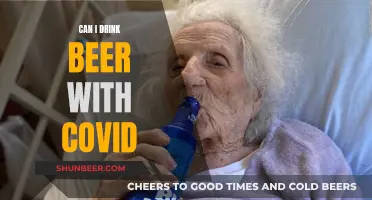
Non-alcoholic beer has gained popularity as a viable alternative for those in recovery from alcohol addiction. However, there is much debate as to whether consuming non-alcoholic beer is considered breaking sobriety. While some people feel that non-alcoholic beers, wines, and liquors are a healthy alternative to alcohol in recovery, others believe that any drink resembling alcohol—intoxicating or not—puts individuals at risk for relapse.
Non-alcoholic beer is designed to taste and look like traditional beer but contains very minimal or no alcohol. It is important to note that while non-alcoholic beer contains minimal or no alcohol, it may still trigger cravings or emotional associations for individuals with a history of alcohol addiction. Therefore, it is crucial for those in recovery to assess their own physical and emotional triggers and consult professionals or support groups to determine if non-alcoholic beer is a suitable choice for their sobriety journey.
| Characteristics | Values |
|---|---|
| Alcohol content | Non-alcoholic beer is typically defined as beer with an alcohol content of 0.5% or less. |
| Taste | Non-alcoholic beer is designed to taste similar to regular beer. |
| Benefits | Non-alcoholic beer can help individuals in recovery feel included in social situations and navigate peer pressure. It can also help beat cravings and act as a tool to reduce alcohol consumption. |
| Risks | Non-alcoholic beer may trigger cravings and reminders of past drinking experiences, potentially leading to a relapse. The ritual of drinking and the sensory experience can be triggering for some individuals in recovery. |
| Individual decision | The decision to consume non-alcoholic beer during recovery depends on individual factors such as triggers, personal goals, and recovery approach. |
What You'll Learn
- Non-alcoholic beer can trigger cravings and cause relapses
- It can be a valuable tool to help people reduce their alcohol consumption
- It may be a good option for those who enjoy the taste of beer
- It can help people in recovery feel included at social events
- It may be a good option for those who want to avoid questions about why they're not drinking

Non-alcoholic beer can trigger cravings and cause relapses
For some individuals in recovery, consuming non-alcoholic beer may trigger cravings and remind them of past drinking experiences, potentially placing their sobriety at risk. It is important for each person in recovery to assess whether drinking non-alcoholic beer will disrupt their ongoing journey and individualise their choices accordingly.
The placebo effect can also play a significant role in the psychological implications of drinking non-alcoholic beer. For some individuals, the act of consuming a beverage that resembles beer can trigger a placebo response, leading them to experience sensations or emotions similar to those associated with alcohol consumption. This phenomenon can have both positive and negative effects, depending on the individual’s mindset and intentions.
Additionally, the smell and taste of non-alcoholic beer may be enough to trigger a relapse in some individuals. The thrill of drinking even an alcohol-free beer could become a slippery slope that leads back to drinking alcoholic beverages. The smell and taste may bring the person back to a period before recovery, triggering a relapse.
The concept of "euphoric recall" is also important to consider. Tasting beer can trigger euphoric recall, which is the memory of the good times of drinking. For an addict or alcoholic, part of the disease is having difficulty remembering or acknowledging all of the negative consequences of active addiction.
In conclusion, while non-alcoholic drinks can be helpful for some people in recovery, they can also trigger cravings and cause relapses for others. It is important for individuals in recovery to assess their own triggers and make informed decisions about whether to consume non-alcoholic drinks.
Whiskey and Beer: Mixing Alcohol Types Safely
You may want to see also

It can be a valuable tool to help people reduce their alcohol consumption
Opinions vary on whether non-alcoholic beer is a valuable tool to help people reduce their alcohol consumption. Some people feel that non-alcoholic drinks are a healthy alternative to alcohol, while others believe that any drink resembling alcohol—intoxicating or not—puts people at risk of relapse.
Non-alcoholic drinks can help people beat alcohol cravings without relapsing. They can also help people feel included at social events where alcohol is served, reducing feelings of isolation and the risk of peer pressure. Non-alcoholic drinks can also be a way for people to wean off alcohol and quit drinking.
However, the taste and ritual of drinking non-alcoholic beer can also trigger cravings and remind people of past drinking experiences, potentially leading to relapse. The act of consuming a beverage that resembles beer can trigger a placebo response, leading people to experience sensations or emotions similar to those associated with alcohol consumption. Additionally, the sound, smell, and feel of non-alcoholic beer can stimulate the reward centres of the brain to release dopamine, potentially causing a craving for real alcohol.
Ultimately, the decision to drink non-alcoholic beer during recovery depends on the individual. It is important to consider one's triggers and stay away from high-risk situations. Consulting with a healthcare professional or support group can help individuals make an informed decision about whether non-alcoholic beer is suitable for their recovery journey.
Drinking Beer at the Airport: Lobby Laws and Limits
You may want to see also

It may be a good option for those who enjoy the taste of beer
Non-alcoholic beer is designed to taste and look like traditional beer but contains very little or no alcohol. It is brewed to taste as close to regular beer as possible without the intoxicating effects of alcohol. This can be a good option for those who enjoy the taste of beer but want to avoid the negative consequences of alcohol abuse.
Non-alcoholic beer has gained popularity as a viable alternative for individuals who want to enjoy the taste and social experience of drinking beer without the alcohol. It provides an option for those in recovery or those who choose not to consume alcohol for health, religious, or personal reasons. The brewing process involves techniques like vacuum distillation, reverse osmosis, or the use of specialised yeast strains that produce minimal alcohol during fermentation, resulting in a beverage that closely resembles traditional beer while keeping the alcohol content negligible.
Non-alcoholic beer comes in various styles, including lagers, ales, stouts, and IPAs, offering a range of flavours to suit different preferences. It can be enjoyed on its own or paired with food, just like regular beer. Some breweries even offer craft non-alcoholic beers, providing diverse and exciting alcohol-free alternatives.
For individuals in recovery, non-alcoholic beer can be a tool to navigate social situations where alcohol is present. It allows them to participate in social gatherings without feeling left out or pressured to consume alcoholic drinks. It provides a sense of normalcy and inclusivity, enabling people to enjoy the taste and experience of beer while maintaining their commitment to sobriety.
However, it is important to note that while non-alcoholic beer contains minimal or no alcohol, it may still trigger cravings or emotional associations for individuals with a history of alcohol addiction. Thus, it is crucial for those in recovery to assess their physical and emotional triggers and consult healthcare professionals or support groups to determine if non-alcoholic beer is suitable for their journey.
Mormons and Root Beer: What's the Deal?
You may want to see also

It can help people in recovery feel included at social events
For many people in recovery, social events can be challenging, as alcohol is often a central part of socialising. Non-alcoholic drinks can help people in recovery feel included at these events, allowing them to participate without feeling left out or pressured to consume alcoholic beverages.
Non-alcoholic beer, also known as NA beer or alcohol-free beer, is designed to taste and look like traditional beer but contains minimal or no alcohol. It provides an option for those in recovery who want to enjoy the taste and social experience of drinking beer without the intoxicating effects of alcohol. By choosing NA beer, individuals in recovery can navigate social situations where alcohol is present while maintaining their commitment to sobriety.
NA beer offers a sense of normalcy and inclusivity, enabling people in recovery to enjoy the taste and experience of beer while abstaining from alcohol. It can help them feel like they are not missing out and reduce feelings of isolation that can occur in early recovery. Additionally, it can help them avoid questions about why they are not drinking, removing the pressure to explain their recovery journey to others.
However, it is important to note that NA beer may still contain trace amounts of alcohol, and for some people in recovery, even a small amount of alcohol is unacceptable. The decision to consume NA beer during recovery is a personal one and should be made based on individual triggers, motivations, and comfort levels. While it can help people in recovery feel included, it may also trigger cravings or emotional associations related to past drinking experiences.
Ultimately, the choice to drink NA beer during recovery depends on the individual's unique circumstances and their ability to assess their physical and emotional triggers. It is crucial to seek professional guidance and support when faced with uncertainty or conflicting emotions to make an informed decision that aligns with their recovery goals.
Beer and Folic Acid: Is It Safe to Drink?
You may want to see also

It may be a good option for those who want to avoid questions about why they're not drinking
Non-alcoholic beer can be a good option for those who want to avoid questions about why they're not drinking. It can be a useful tool for people in recovery to navigate social situations where alcohol is present. It allows them to participate in social gatherings without feeling left out or pressured to consume alcoholic beverages. It provides a sense of normalcy and inclusivity, enabling individuals to enjoy the taste and experience of beer while maintaining their commitment to sobriety.
Non-alcoholic beer can be a preventative solution in social situations, as people may assume it is an alcoholic drink. Pouring the beverage into a cup or glass can further disguise it, and no one will be able to tell the difference. This can be especially useful in networking events or industry shindigs, where a lot of networking takes place at the bar. Similarly, at important social events such as weddings or reunions, non-alcoholic beer can be a way to fit in without raising questions about one's drinking choices.
However, it is important to note that non-alcoholic beer may still contain trace amounts of alcohol. In the United States, products labelled as "non-alcoholic" can contain up to 0.5% alcohol. While it is highly unlikely for a person to become intoxicated from drinking non-alcoholic beer, the presence of alcohol may be a concern for some individuals in recovery. Additionally, the taste, smell, and ritual of drinking non-alcoholic beer may be triggering for some people and could potentially lead to a relapse.
Beer and Allergy Medicine: Safe Mix?
You may want to see also
Frequently asked questions
Non-alcoholic beer, or NA beer, is designed to taste and look like traditional beer but contains very little to no alcohol. In the US, to be labelled non-alcoholic, a beer must contain 0.5% alcohol by volume (ABV) or less.
This is a highly debated topic. Some people believe NA beer is a healthy alternative to alcohol for people in recovery. Others think that any drink that resembles alcohol could trigger a relapse. Ultimately, it's a personal decision that depends on an individual's relationship with alcohol and their recovery goals.
NA beer can help people in recovery feel included in social situations without compromising their sobriety. It can also help them beat alcohol cravings and provide a path to ultimate sobriety by allowing them to gradually reduce their alcohol intake.
The taste and ritual of drinking NA beer can trigger cravings and remind people of their past drinking experiences, potentially leading to a relapse. The act of consuming an NA beer can also trigger a placebo response, leading to sensations similar to those associated with alcohol consumption.
There is no one-size-fits-all answer. Each person must evaluate their own situation and decide if the benefits of NA beer outweigh the risks. It's crucial to consider personal triggers, motives, and recovery goals when making this decision.







